Barbecuing is one of Canadians' favourite pastimes, and we usually don't let bad weather stop us from engaging in outdoor cooking. If you want to upgrade or update your backyard grilling setup, grill shopping is fun, but you may have some questions, such as gas or charcoal, which size you should be looking for or if you want or need any additional features.
As it's an investment into the future of tasty meals, you want to make an informed decision before committing to a new barbecue to make the most out of your barbie and make your outdoor gatherings an all-around success.
Whether you’re wondering what to look for when buying a gas BBQ or a charcoal grill buying guide, read on to learn about all the important things to consider when buying a BBQ.
Important Things to Consider When Buying a BBQ
Types of BBQs
Let's first look at the main types of BBQs available to give us a solid foundation.
Charcoal Grills
Charcoal barbecues are the most traditional way to grill your meats and vegetables and give your food a smoky flavour due to charcoal briquettes or lump charcoal. They are also known for their versatility, as you can opt for direct grilling with high heat and indirect cooking when opting for low and slow, making this type excellent for a wide range of foods.
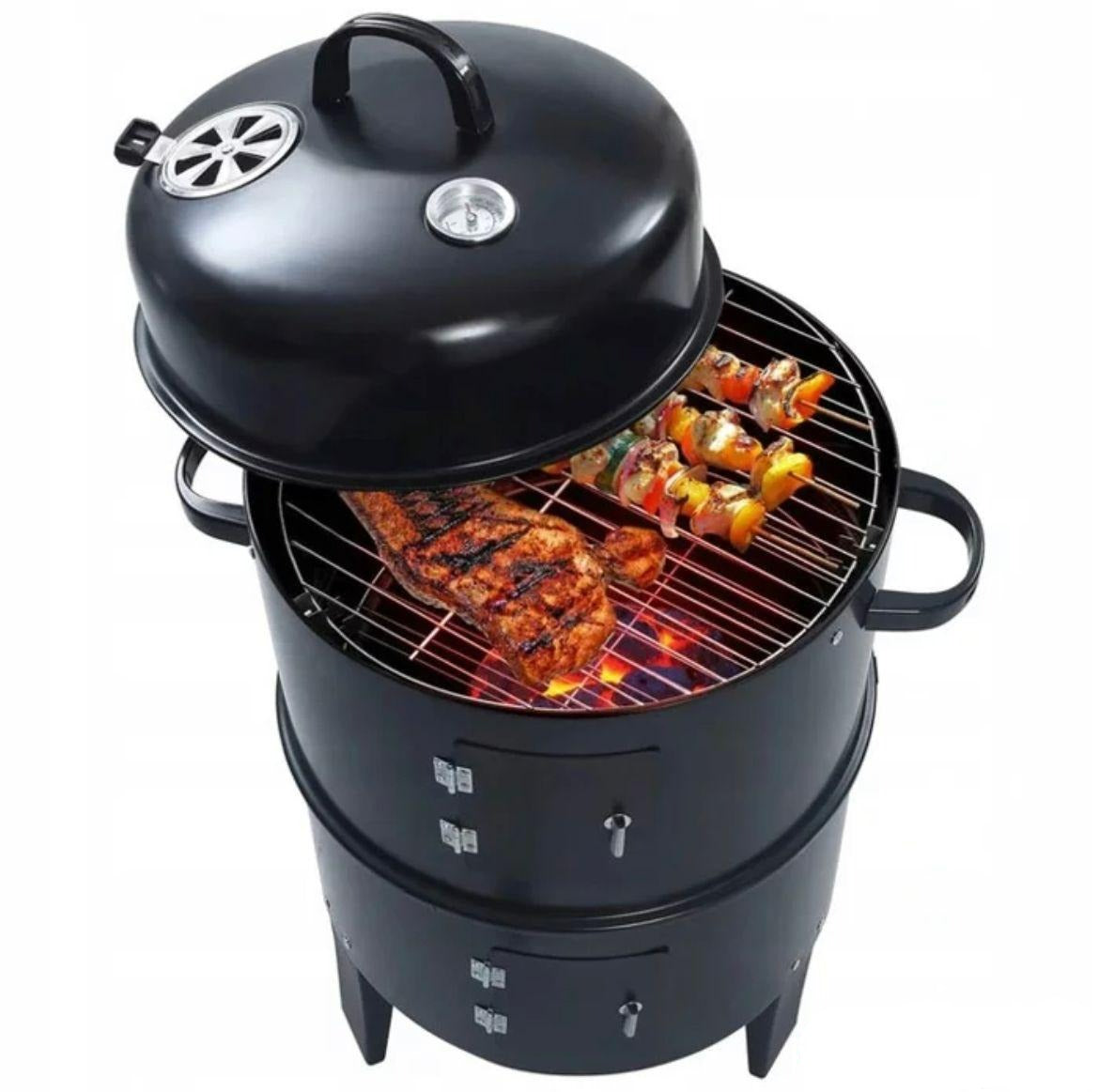
The biggest challenge could be temperature control, which requires adjusting the airflow and adding more charcoal for extended cooking.
Gas Grills
Gas grills have become a very popular option because they are easy to start and provide instant heat with the turn of a knob. Propane or natural gas is used as a fuel source, saving you money over time. Their precise temperature control is one of the most significant benefits, making them suitable for cooking various dishes. And if you’re wondering how to buy gas for your BBQ, many gas stations and even grocery stores have propane tanks for sale or even a tank where they can refill yours.
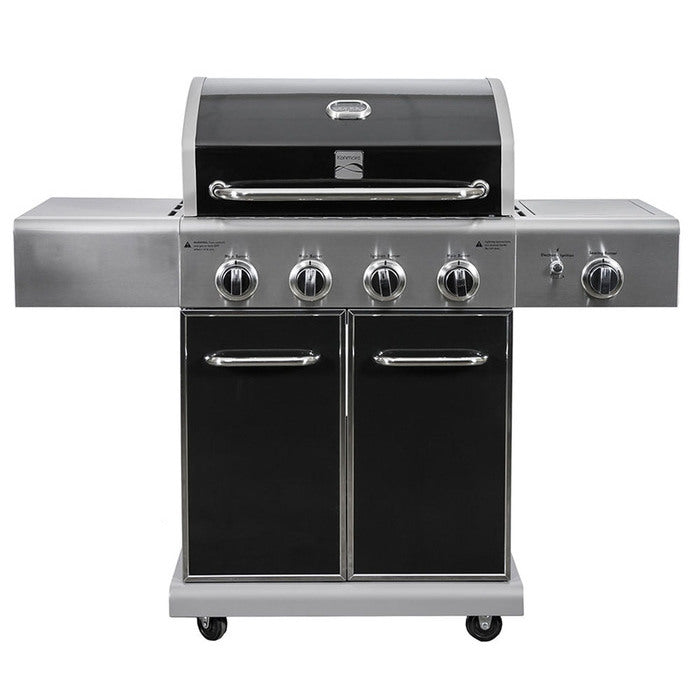
They are also known for their cleanliness by producing minimal ash and are relatively easy to clean compared to charcoal grills. Generally, they are also considered safer as the open flame is easy to control.
Electric Grills
Due to their size and lack of open flame, electric grills are popular for indoor spaces or small areas like balconies. They are easy to use and clean and only require a standard electrical outlet. They have no open flame, so they are generally considered safer for indoor cooking.
However, electric grills may not provide the same smoky flavour as charcoal or gas grills.
Pellet Grills
An entirely different type of BBQ is the pellet grill, which uses wood pellets as fuel, imbuing a unique smoky flavour into the food depending on which kind of wood pellet you choose. Popular wood flavours are hickory, applewood, and mesquite.
As pellet grills often have precise temperature control features, they are versatile and great for smoking, grilling, and baking. They also feature an automatic pellet feeder that maintains a consistent temperature throughout cooking.
Size and Cooking Area
Many people think that the bigger the BBQ, the better, but consider how many people you will be grilling and how you usually cook. If you cook for two and don't host big BBQ parties, you don't need a colossal barbecue that may look impressive but is ultimately a waste of money and space. Calculate about 50 square inches of primary cooking space per portion of food. If you want to do more than throw some hot dogs on the grill, consider additional cooking areas, such as side burners or warming areas, or areas for searing, slow cooking and finishing on the barbecue itself.
Build Quality and Material
Regarding BBQ construction, selecting suitable materials ensures durability and weather resistance. BBQs are often exposed to harsh outdoor conditions, including rain, sun, wind, and fluctuating temperatures. Hence, choosing materials that can withstand these elements is essential to ensure your BBQ lasts for years. Two popular materials for BBQ construction are stainless steel and cast iron.
Stainless Steel
Stainless steel is highly durable and resistant to rust and corrosion. This makes it an excellent choice for BBQ construction, as it can withstand exposure to moisture and various weather conditions. It also has excellent heat retention properties, so it can distribute and hold heat evenly, making it ideal for grilling. Stainless steel is relatively easy to clean and maintain. It doesn't require seasoning like cast iron, which can be time-consuming. Regarding the price, stainless steel BBQs tend to be more expensive upfront, but their durability often justifies the investment.
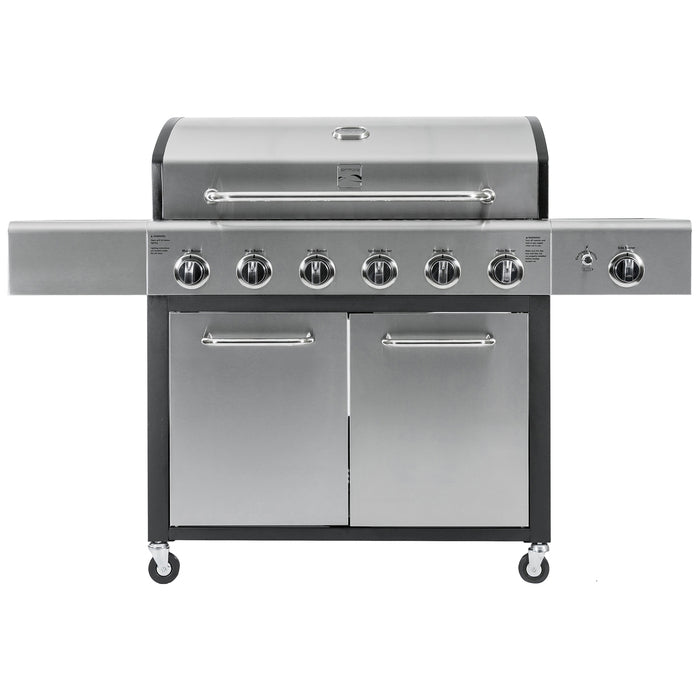
Cast Iron
The other popular option is cast iron, known for its exceptional durability and longevity. Properly maintained cast iron BBQ grates and cookware can last for generations. Cast iron has excellent heat retention properties, which allows it to provide consistent and even cooking temperatures. The most significant challenge is that cast iron requires regular seasoning to maintain its non-stick surface and prevent rust. This involves coating the surface with oil and heating it to create a protective layer. Cast iron is also considerably heavier than stainless steel, making it more challenging to move or transport.
Importance of Durability and Weather Resistance
BBQs can be a significant investment, and you want them to last for many seasons without needing frequent replacements despite being exposed to all kinds of weather conditions. Durable materials ensure consistent heat retention and distribution, leading to better cooking results. Weather-resistant materials prevent rust and corrosion, which can compromise the structural integrity of the BBQ and potentially lead to safety hazards. Investing in a durable, weather-resistant BBQ may cost you a bit more upfront, but reducing maintenance and replacement costs can save you money in the long run.
Heat Source and Temperature Control
Heat source control is the backbone of successful barbecue cooking. It's the difference between a juicy, perfectly seared steak and one that's charred on the outside and raw on the inside. Key features like burners, vents, and thermometers are critical in achieving this control. Burners regulate the intensity and distribution of heat, vents manage airflow and oxygen supply, and thermometers provide real-time temperature feedback. Temperature control isn't just about preventing burnt burgers. Without it, you're simply playing with fire, but with it, you're mastering the art of barbecue.
Precise temperature control is the secret sauce behind great barbecue. It ensures that your food cooks evenly, avoiding those dreaded hot and cold spots on the grill. Burners allow you to tailor the heat to different zones, vents help manage flare-ups, and thermometers tell you when that steak hits medium-rare perfection or when your ribs have reached fall-off-the-bone tenderness. Temperature control isn't just a luxury; it's the key to unlocking barbecue mastery, ensuring every bite is a flavour-packed delight.
Additional Features
Some BBQs have additional features that may enhance your grilling experience and make it even more versatile.
- Side Burners: Side burners are like extra hands in the outdoor kitchen. They provide additional cooking space for preparing sides, sauces, or even boiling water while your main grill is in use. This feature allows for a seamless cooking experience, eliminating the need to run back and forth to the indoor kitchen constantly.
- Rotisserie Kits: A rotisserie kit can turn an ordinary BBQ into a culinary masterpiece. It allows you to slow-cook whole chickens, roasts, or turkeys by rotating them over the heat source. This method ensures even cooking and produces succulent, juicy meats with a beautifully crispy exterior.
- Smoker Boxes: Smoker boxes are a must-have for enthusiasts seeking that smoky, wood-fired flavour. These small containers can be filled with wood chips or pellets and placed directly on the grill grates. As they heat up, they release aromatic smoke that infuses your food with that irresistible smokiness.
- Built-in Storage: Built-in storage options, such as cabinets, drawers, or shelves, provide a convenient solution for keeping BBQ essentials within arm's reach. They offer a designated space for storing utensils, grilling tools, charcoal, and even extra propane tanks.
Portability and Storage
BBQ portability is a game-changer if you don't want to remain constricted to your backyard, whether camping in the wilderness or tailgating at a sports event. Look for compact, lightweight BBQ models designed for travel. Portable grills often feature foldable legs, carrying handles, and latches for easy transport. Consider fuel options like portable propane tanks or compact charcoal setups for convenience. When selecting a portable BBQ, prioritize durability, as it may encounter rough handling during transit.
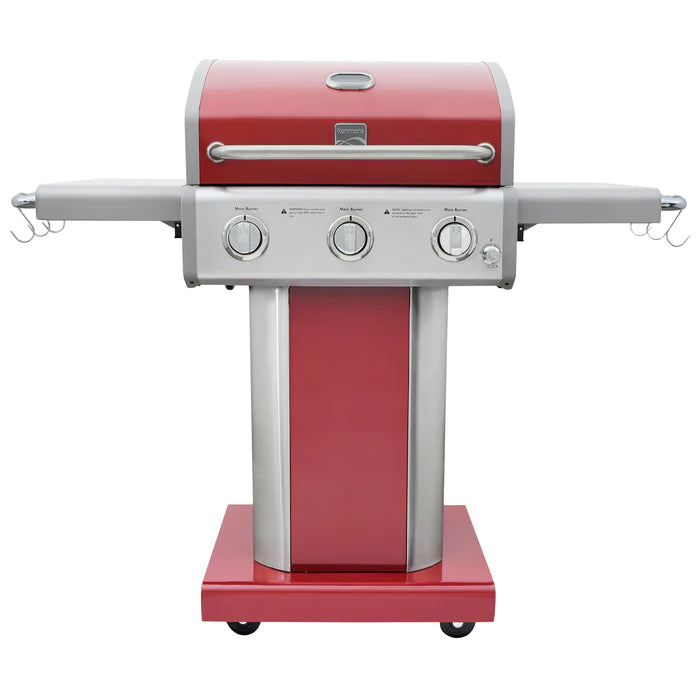
Invest in a sturdy, weather-resistant cover to prolong your BBQ's life and protect it from the elements. When not in use, these covers shield your grill from rain, UV rays, dust, and debris. Store your BBQ in a secure, dry place between uses when camping or tailgating to prevent rust and damage. Always clean the grill grates and interior after each use to prevent grease buildup, which can attract pests and cause deterioration. Consider carrying a small brush or grill scraper in your portable BBQ kit for easy cleanup. Proper care and protection ensure that your BBQ remains in excellent condition for many outdoor adventures.
Budget Considerations
When working within a budget, finding the proper BBQ is about balancing affordability and functionality. For budget-conscious shoppers, charcoal grills often offer the best bang for your buck. Simple kettle-style grills are highly cost-effective and can provide excellent grilling results. If you're willing to invest more, entry-level propane or electric grills offer convenience and quicker cooking times without breaking the bank.
For mid-range budgets, you can explore a broader range of options. Look for propane grills with multiple burners, which provide more cooking space and flexibility. These grills often come with additional features like side burners or built-in thermometers. If you prefer charcoal, consider larger models with adjustable grates or smoker boxes for added versatility. Electric grills in this price range may offer more advanced temperature control and larger cooking surfaces.
For those with larger budgets, premium propane or natural gas grills can provide a high-end grilling experience. These grills often feature stainless steel construction, advanced temperature control systems, and cooking zones. Pellet grills are another option in this category, offering smoking, grilling, and roasting versatility. Ultimately, finding the proper BBQ within your specific price range means carefully weighing your priorities and selecting a grill that meets your cooking needs while respecting your budget.
Brand Reputation and Reviews
When searching for the perfect BBQ, you must do your homework and research different brands while paying close attention to customer reviews. Start by identifying your specific needs and preferences: size, fuel type, or features. Then, look for reputable brands that align with your criteria. Brands like Kenmore, Weber, Traeger, and Broil King have earned a solid reputation for consistently delivering quality grills that satisfy customers. However, don't limit yourself to these options; explore others to ensure you find the best fit for your requirements. Customer reviews on retail websites, forums, and Google provide valuable insights into real customer experiences. They can help you make an informed decision about which BBQ brand and model to choose.
Weber, for example, is renowned for its durable construction and excellent customer support. Kenmore strikes an outstanding balance between affordability and functionality. Traeger is a top choice for pellet grills known for their versatility. Broil King offers a wide range of gas grills with innovative features. These brands have earned customers' trust over time, but remember that individual grill models within a brand can vary in features and performance, so it's crucial to delve into specific product reviews and comparisons as well.
Safety Measures
Safety should be a top priority whenever you fire up your BBQ, regardless of which type you choose. First and foremost, ensure your grill is placed on a stable, non-flammable surface, away from any structures, overhanging branches, or combustible materials. Keep a fire extinguisher nearby and familiarize yourself with its operation. When lighting the BBQ, use proper ignition tools and follow the manufacturer's instructions carefully.
Never leave your grill unattended; always keep children and pets away from the cooking area. Clean your grill regularly to prevent grease buildup, a common cause of flare-ups. Lastly, be cautious when handling hot surfaces and utensils, using grill gloves and appropriate tools. Practicing these safety measures ensures that your BBQ experience is enjoyable and incident-free.
Maintenance and Cleaning
Regular cleaning and maintenance are essential for the longevity and performance of your BBQ. Neglecting these tasks can lead to a buildup of grease, rust, and food residues, which not only affect the flavour of your food but also reduce the efficiency and safety of your grill. Cleaning your BBQ regularly helps prevent potential fire hazards, ensures even cooking, and extends its life.
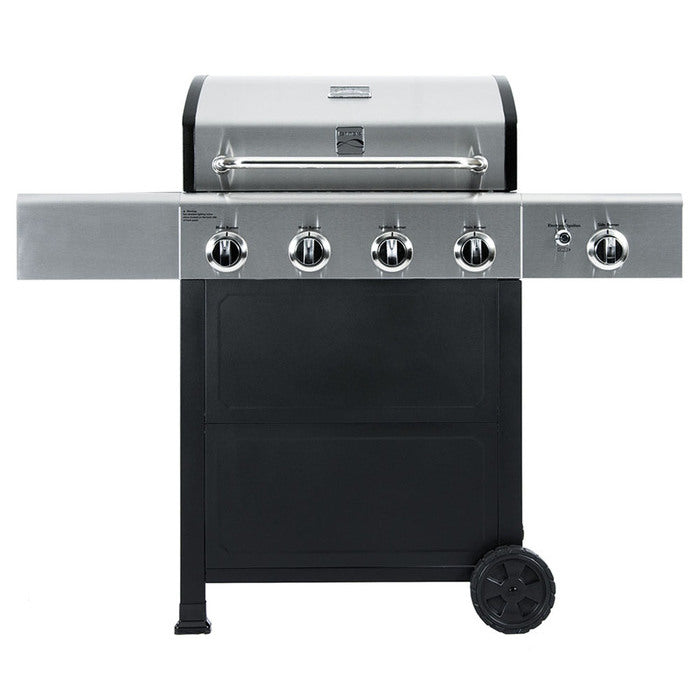
Cleaning methods vary depending on the type of BBQ. Start by turning off the gas supply and disconnecting the propane tank for gas grills. Remove the grates and heat shields, then clean them with a grill brush and soapy water. Empty the grease tray and clean it as well. Remove ash after each use for charcoal grills and brush the grates while hot. For both types, check burners or vents for clogs and inspect hoses for leaks. Stainless steel surfaces can be wiped down with stainless steel cleaner to maintain shine.
Proper storage is also crucial to protect your BBQ from the elements. Use a high-quality cover to shield it from rain, sun, and other outdoor elements when not in use. Store propane tanks away from direct sunlight and in a well-ventilated area, and ensure all valves are tightly closed. These cleaning and storage practices will help keep your BBQ in top shape, providing delicious, safe, and consistent results every time you grill.
Personal Preferences and Cooking Style
When selecting a BBQ, aligning it with your cooking style and preferences is essential. Do you relish the art of slow-cooking, savouring tender, smoky meats? Or is the rapid sear and grill your culinary trademark? Are you intrigued by the world of smoking, aiming to infuse deep flavours into your dishes? And don't forget to ponder how often you'll be firing up the BBQ – will it be a weekend ritual or the centrepiece of special occasions? Your answers to these questions will lead you to the ideal grill that harmonizes with your unique tastes and cooking habits, ensuring each meal is a delight.
Conclusion
Buying a BBQ is an investment in your culinary future, so choosing the right one is essential. Determine which type is right for you and consider the size, materials, features, ease of maintenance and more to make an informed decision. After all, you want your food to taste fabulous and not like regret.

